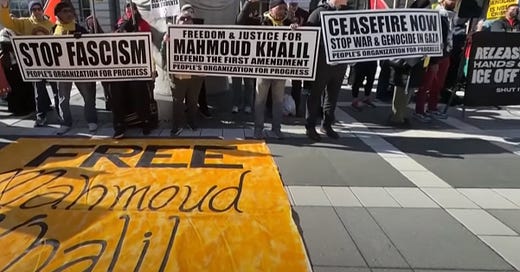No, The First Amendment Doesn’t Protect Anti-American Agitation
The First Amendment is not a suicide pact between a nation and foreigners who wish it harm
Last week, an immigration judge ruled that the Trump administration met the legal requirements under the Immigration and Nationality Act (INA) to deport Mahmoud Khalil, who is a U.S. permanent resident and also a prominent pro-Palestinian political organizer.
As a quick refresher, the arrest of Khalil is part of a broader crackdown by the Trump administration on revoking the student visas of political activists who have taken part, or supported, the Pro-Palestinian/Anti-Israel movements that have taken hold of American college campuses since the Oct. 7 Hamas attack on Israel.
Under the INA, while foreign nationals cannot be excluded or deported for lawful speech or action, an exception exists if the secretary of state personally determines that an alien’s presence or activities would potentially have serious adverse consequences for U.S. foreign policy.
This exception is the justification for deportations used by Secretary of State Rubio as well as White House Deputy Chief of Staff Stephen Miller, who assert that foreign nationals who advocate for causes like “The total eradication of Western Civilization” pose a serious threat not only to America’s foreign policy, but also America’s social fabric.
The case has stirred intense debate over constitutionally protected free speech in the United States and the chilling effect targeting political organizers under immigration law could have on political dissent.
Khalil’s attorneys echoed these concerns, stating, “This case is intentionally projecting a message of repression about who can say what in this country and the consequences to your liberty and your life if you object to U.S. policy.”
Libertarians, who are notorious free speech absolutists, have also expressed concern that the secretary of state possesses “seemingly unlimited discretion to decide when people are subject to deportation because of their political views” under the INA.
Admittedly, one individual determining what qualifies as acceptable political speech appears incompatible with modern “democratic” norms, particularly when people perceive the First Amendment and the U.S. Constitution as applicable not only to American citizens but to the entire world.
But the question of whether one person, in this case, the secretary of state, should have the power to decide what ideas are acceptable and which are not tolerated, the reality is that someone always decides, as German political theorist Carl Schmitt argued, “Sovereign is he who decides on the exception.”
The secretary of state’s ability to invoke the INA’s exception clause is a modern enactment of Schmitt’s sovereign argument — a clear exercise of power that targets a particular type of political speech as unacceptable. In this case, the Trump administration is targeting not only groups that they deem to be antisemitic but also groups that align more broadly with anti-Western movements.
CLICK HERE to read the rest of my article over at The Federalist!





